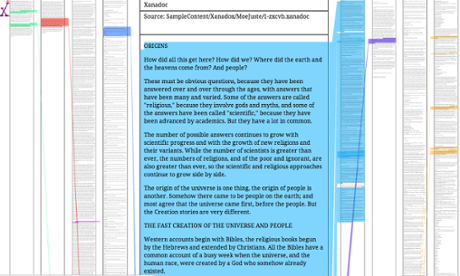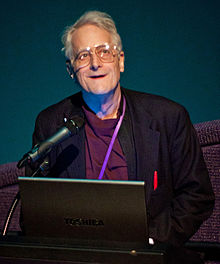Released record long-term software, created 54 years

When consumers are promised new powerful programs that change their lives, and then delays and postponements begin, the situation is not pleasant.
So, Mac OS X was first shown under the code name Rhapsody in 1997, but the release of the first version took place only four years later. The release of Windows Vista was planned for 2003 as a minor update between Windows XP and a full-fledged new version, but I had to wait for three years.
')
However, both of these examples are nothing compared to the Xanadu project, which at the end of April was presented without an extra pump at an event at the University of California, Chempen. The development of Xanadu began 54 years ago in 1960. This is the longest developed software in history.
It was Xanadu developer Ted Nelson (Ted Nelson) who coined the term “hypertext” to refer to the clicked links in his project. This term in the form of the abbreviation "ht" stands for the abbreviation "http".
In short, Xanadu allows you to create documents into which the sources are referenced. According to Nelson, this creates a “whole form of literature in which links are not destroyed by changing versions, documents can be displayed next to each other for comparison or annotations and you can immediately see the origin of each quotation, and with a full copyright protection system. It is a system for literary, legal, and business use that provides seamless and unqualified quoting at any time and in any quantity. ”
On the Internet is a version called OpenXanadu. This is a simple document with quotes from eight sources, such as the King James Version of the Bible and a Wikipedia page on the theory of the stationary universe. Navigation is carried out with a space and arrows, and the instruction warns: do not touch the mouse! You can move between the originals and the resulting document and back.
At first glance, it looks like a web, and for good reason. At one time, Xanadu could well have outstripped Tim Berners-Lee, the inventor of the world wide web, she’s the web. But the project stalled, and the web came to the finish first.

Having missed a chance to invent the web, now Nelson sees an alternative to formats in Xanadu that are trying to look like paper rather than invent something new for the digital age.
“In the 1980s, we blundered, missed the chance to become a global hypertext (the web occupied this niche). However, we can still compete with PDF, which mimics paper, by showing text links. ”
In 1995, when the development of the project lasted for 35 years, the author of Wired, Gary Wolf (Gary Wolf), described Nelson as a man who never knew how to put his ideas into practice, although these ideas themselves were very important.
“Nelson’s difficulties gave rise to one of the most powerful developments of the 20th century,” Wolfe wrote then. “The goals of Xanadu, such as the universal library, the global information index and the computerized royalty system, were shared by many of the smartest programmers of the first generation of hackers.”
Source: https://habr.com/ru/post/225535/
All Articles